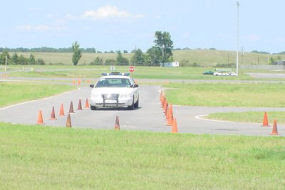
Defensive Driving (EVOC)
TrainingAdmin
Primary Instructor
Course Overview
This online Emergency Vehicle Operations and Control (EVOC) Training for Security Officers course provides security professionals with the essential knowledge and skills to safely and effectively operate emergency vehicles in various security contexts.
This comprehensive online program covers the legal and ethical considerations surrounding emergency vehicle operation, emphasizing defensive driving techniques, vehicle control, and the paramount importance of prioritizing public safety. Through interactive modules, videos, and realistic scenarios, you’ll learn how to assess and respond to emergencies, navigate challenging road conditions, and operate emergency equipment responsibly.
The course covers topics such as vehicle dynamics, pursuit driving (where applicable and legally compliant, and with a strong emphasis on its limitations and risks), traffic laws and regulations specific to emergency vehicles, proper vehicle maintenance, and the use of warning devices.
Crucially, this course also delves into vehicle control techniques, including skid control, evasive maneuvers, and proper braking techniques, to ensure safe vehicle handling in emergencies. This online, self-paced format allows you to learn at your own convenience.
Upon completion, you’ll have a solid understanding of emergency vehicle operations and control principles, safe driving practices, and the critical role of sound judgment in emergency response.
This training is a valuable asset for any security officer authorized to operate emergency vehicles, enhancing their professionalism and ensuring they are prepared to handle critical situations safely and effectively.
Important Note: This online course provides theoretical knowledge. Practical, hands-on driver training with a certified instructor is essential and legally required in most jurisdictions for actual emergency vehicle operations. This online course does not replace that requirement. It is designed to supplement and enhance practical training, not substitute for it. It is crucial that this online component be followed by practical, in-vehicle training with a qualified instructor.
